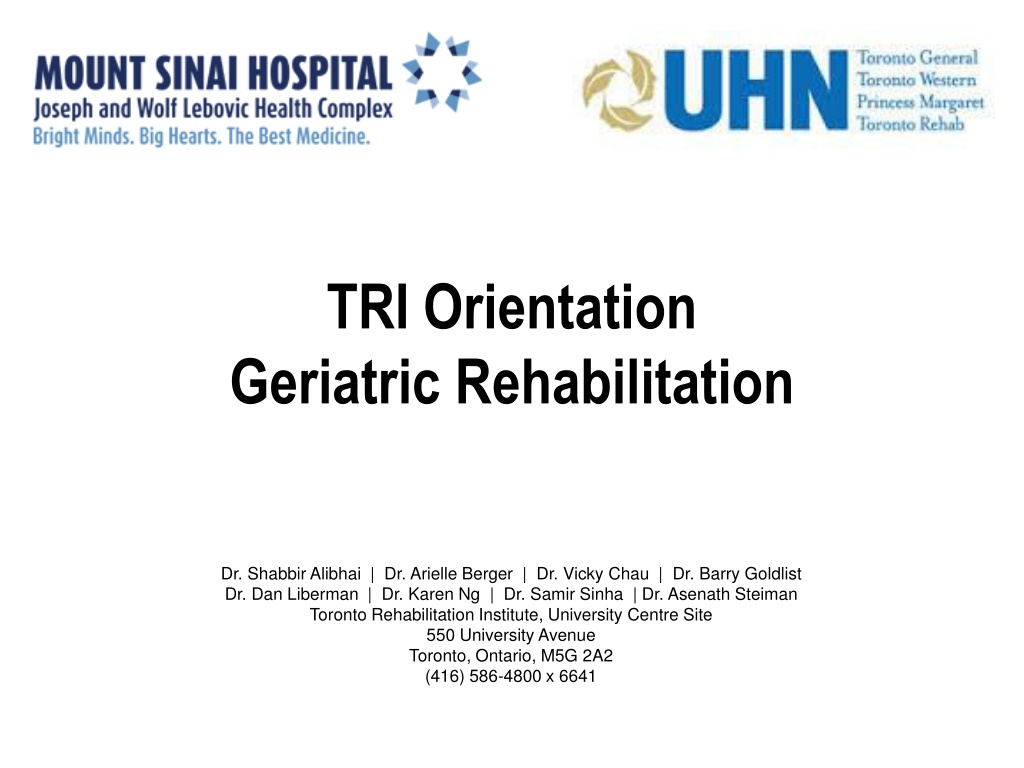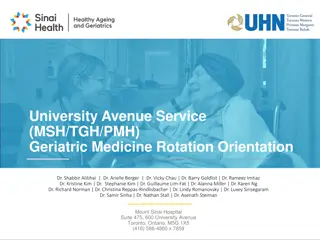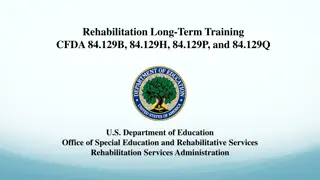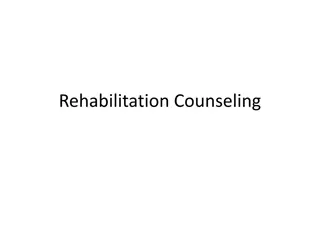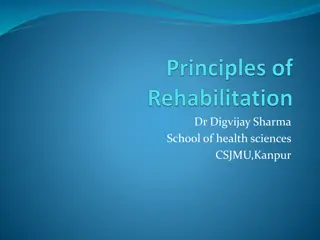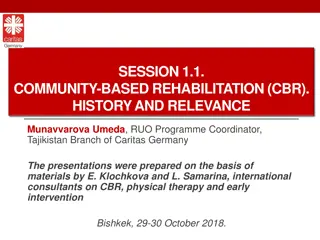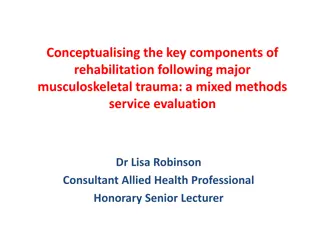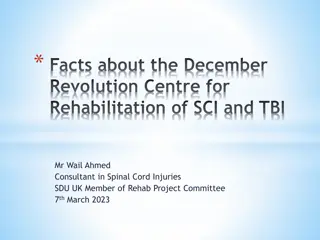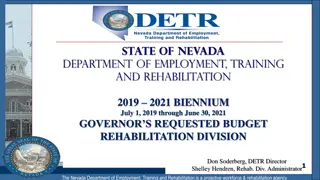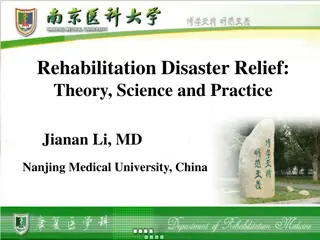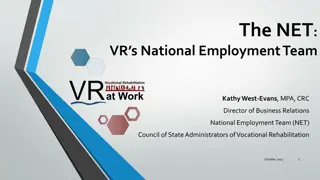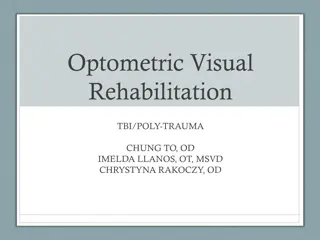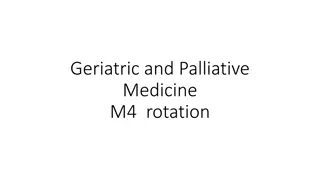Understanding Geriatric Rehabilitation and Disability Models
Acute medical illnesses can lead to functional decline in elderly individuals, requiring comprehensive geriatric assessments and rehabilitation. This involves addressing factors like frailty, comorbidities, and social/environmental barriers. Disability is viewed through both medical and social models, with the biopsychosocial model integrating these perspectives. The World Health Organization's International Classification of Functioning, Disability, and Health (ICF) framework provides a holistic approach to understanding disability. Geriatric rehabilitation aims to limit disability, prevent decline, and maintain independence in older adults.
Download Presentation

Please find below an Image/Link to download the presentation.
The content on the website is provided AS IS for your information and personal use only. It may not be sold, licensed, or shared on other websites without obtaining consent from the author. Download presentation by click this link. If you encounter any issues during the download, it is possible that the publisher has removed the file from their server.
E N D
Presentation Transcript
TRI Orientation Geriatric Rehabilitation Dr. Shabbir Alibhai | Dr. Arielle Berger | Dr. Vicky Chau | Dr. Barry Goldlist Dr. Dan Liberman | Dr. Karen Ng | Dr. Samir Sinha | Dr. Asenath Steiman Toronto Rehabilitation Institute, University Centre Site 550 University Avenue Toronto, Ontario, M5G 2A2 (416) 586-4800 x 6641
Outline Introduction Geriatric consultations Clinics & Programs Rounds & Education
Introduction Acute medical illness & hospitalization often precipitate functional decline. Many factors additionally contribute to further disability that often impacts rehabilitation. Frailty Multiple medical Comorbidities Acute Medical Illness & Hospitalization Disability & Functional Decline
The social model of disability, on the other hand, sees disability as a socially- created problem and not at all an attribute of an individual. On the social model, disability demands a political response, since the problem is created by an unaccommodating physical environment brought about by attitudes and other features of the social environment. On their own, neither model is adequate, although both are partially valid. Disability is a complex phenomena that is both a problem at the level of a person's body, and a complex and primarily social phenomena. Disability is always an interaction between features of the person and features of the overall context in which the person lives, but some aspects of disability are almost entirely internal to the person, while another aspect is almost entirely external. In other words, both medical and social responses are appropriate to the problems associated with disability; we cannot wholly reject either kind of intervention. A better model of disability, in short, is one that synthesizes what is true in the medical and social models, without making the mistake each makes in reducing the whole, complex notion of disability to one of its aspects. This more useful model of disability might be called the biopsychosocial model. ICF is based on this model, an integration of medical and social. ICF provides, by this synthesis, a coherent view of different perspectives of health: biological, individual and social. Conceptualizing Disability The following diagram is one representation of the model of disability that is the basis for ICF Health condition (disorder or disease) Participation Participation Restriction Body Functions & Structure Activity Activity Limitation Impairment Personal Factors Environmental Factors Contextual factors 9 WHO & ICF et al., 2002.
Geriatric Rehabilitation a branch of geriatric medicine concerned with limiting the extent of disability, preventing functional and social decline, and delaying or preventing loss of independence and institutionalization AGS Education Committee. The Training of Geriatric Fellows in Rehabilitation: AGS Education Guidelines. 2002.
A Specialized Focus Frail & medical complex older adults Holistic vs. Illness (e.g. stroke rehab) approach All factors that impair function Multidisciplinary team Multifactorial & individualized interventions to improve function
Outcomes of Geriatric Rehabilitation Outcomes At discharge At Follow Up OR 1.75 OR 1.36 Function (95% CI 1.31 to 2.35) (95% CI 1.07 to 1.71) Nursing Home Admission RR 0.64 (0.51 to 0.81) RR 0.84 (0.72 to 0.99) Mortality RR 0.72 (0.55 to 0.95) 0.87 (0.77 to 0.97) Bachmann et al., BMC 2010.
Geriatric Consultation Team You! Geriatrician Florence Paat, Nurse Practitioner
Geriatric Referrals Automatic Geriatric Rehabilitation Unit (6 South) Geriatric Psychiatry Unit (5 South) MSK Unit (7 & 8 South) Other Other TRI floors
Geriatric Rehabilitation Unit (6 South) 25 bed inpatient unit built on a co-management model Hospitalist (Dr. Robert Lam) Geriatrician Geriatric Nephrologist (Dr. Vanita Jassal) Geriatric patients & patients with dialysis needs are admitted into Team A, B, or C Consultations Karlee Lin sends e-mail notifications of new admissions to geriatricians daily Requests also located in geriatrician mailbox on 6S nursing unit
Co-Managing Rehabilitation Geriatrics Hospitalist (MRP) Geriatric Nephrology Geriatric related issues (e.g. cognition, function, medications, pain, sleep, disposition) Management of complex medical diseases Dialysis & Dialysis related issues* Management of complex medical diseases, if needed Urgent and/or medical emergencies However, we frequently provide collaborativecare * For dialysis patients, we complete a CGA and provide follow up as needed
Geriatric Psychiatry Unit (5 South) Locked unit of patients admitted with dementia related behaviours built upon a co-management model Hospitalist (Dr. Tazkarji) Geriatric Psychiatrist (Drs. Iaboni & Keren) Consultations Requests obtained via May Seeto
MSK (7 & 8 South) Inpatient rehabilitation unit for patients with MSK conditions and/or those recovering after surgery built upon co-management model between hospitalist (7S Dr. Steven Fried; 8S Dr. John Goldsand) & physiatrist Automatic consultation All patients with hip fracture transferred from MSH/TWH Geriatricians receive e-mail notifications of newly transferred patients
Limited Consultation & Follow Up Provides continuity of care and focused management of geriatric related issues Cognition (e.g. delirium, depression) Bone Health Disposition Obtain MSH/TWH geriatric consultation, follow up, and sign out notes to assist with your management plan
Consult Recommendations GRU (6S) Order blood work directly into EPR Complete respective paper requisition for other investigations (e.g. ECG, CXR, CT Head) Write medication orders directly on order sheet NO SUGGEST ORDERS MSK (7S & 8S) Write suggestions in MRP s black book Geriatric Psychiatry (5S) Write suggestions in Dr. Tazkarji s black book; or E-mail Dr. Tazkarji (MRP) for recommendations
Consultation Notes All consultation notes are dictated Include date, start/end times of consultation Place written yellow consultation notes (if used) & signed transcribed dictation notes in the chart * Please ensure you obtain your UHN dictation code at the beginning of your rotation * Follow up notes written in multidisciplinary progress notes section
AMBULATORY CLINICS & PROGRAMS
Ambulatory Clinics Geriatric Day Hospital Clinic at TRI (2nd Floor South Wing ) Drs. Arielle Berger, Asenath Steiman Michelle Cordeiro (416) 597-3422 ext. 3065 Geriatric Medicine Clinic at Bickle Centre Complex Continuing Care Specialty Clinics, Main Floor, Rm S-217 Dr. Arielle Berger Geriatric Nephrology Clinics at TGH (12NU Renal Clinics) Dr. Vanita Jassal Samantha Ramsammy samantha.ramsammy@uhn.ca
Community Based Experiences Independence at Home (IAH) Community Outreach Team Drs. Dan Liberman, Asenath Steiman Sabrina Haq (Pharm), Agnes Kulinek (RN), Anna Siciliano (SW), Marissa Wilson (PT) Our new Interprofessional Team has opportunities for learners to do home visits when available
Programs Falls Prevention Program (2nd Floor, South Wing) Brenda Le/Ramona Gheorghe, RN & Aliza Neuhof, PT 416-597-3422 X 3777 or 3783 Geriatric Day Hospital Program (2nd Floor, South Wing) Sasha Dipnarine (416) 597-3422 ext. 3065 Inpatient Dialysis Program (Ground floor, East Entrance) Pre-arrange with Dr. Vanita Jassal
Weekly Rounds MONDAY TUESDAY WEDNESDAY THURSDAY FRIDAY 01 02 03 04 05 MULTIDISCIPLINARY CASE CONFERENCE ROUNDS @ TRI, 6 6S Med Review Rounds @ TRI, 6S Nursing Station with Geriatrician, Hospitalist, and Pharmacist 9:30- 12:00 th Floor, Rm 6-005 2:30 - 3:00 CONSULTATION STAFF: ALIBHAI, Dr. Shabbir (416) 340-5125, pgr: (416) 790-4665 KEREN, Dr. Ron (416) 603-5667-Geriatric Psychiatry Consults-TWH IANNETTA, Nadia PT, TWH, pgr: (416) 719-0037 MEDEIROS, Oriana OT, TWH pgr: (416) 719-2097 Natasha Bhesania PT, MSH x102962 GOLDLIST, Dr. Barry (416) 586-4800 Ext.6641, pgr:(416) 790-9619 LEVINE, Helen SW, TWH (416) 340-4800 Ext.2296, pgr: (416) 715-1196 BERGER, Dr. Arielle: pgr:(416)790-0083 SINHA, Dr. Samir, (416) 586-4800 Ext 7859, pgr(416) 380-5450 FAN-LUN, Chris, RPh, MSH,(416)586-4800 Ext2641, pgr: (416)380-5835 MARZILIANO, Carmelina, SW, MSH, (416)586-4800 Ext 5226, or x 102987 REECE, Katherine, OT, TWH pgr:(416)719-2102 TULLY, Sandra, ACNP, TWH, pgr: (416) 719-1273 LIBERMAN, Dr. Dan; pgr: (416)715-0140 RAMSDEN, Rebecca, ACE NP, MSH, (416)586-4800 Ext 2821, pgr:416-380-5128 SAMUEL, Petal, APN, TWH, pgr: (416)790-5307 CHAU, Dr. Vicky; pgr: (416)715-0525
Experiential Learning in Rehabilitation For a new patient admission (on the 1st or 2nd day), observe allied health team new patient assessments Focuses on interprofessional learning with the RN, OT, PT, Nutritionist, Pharmacist, SW, Recreational therapist, wound care NP For this patient, attend the PT/OT sessions, care conferences, etc. to appreciate the longitudinal trajectory of rehabilitation and patient care
Education MONDAY TUESDAY WEDNESDAY THURSDAY FRIDAY 01 02 03 04 05 ORIENTATION with Geriatrician @ MSH, 4th floor, Room 475 DEMENTIA SEMINAR with Dr. David Tang-Wai @TWH, 8E, Room 410 ALLIED HEALTH SEMINARS: Competency Issues in the Hospital and Elder Abuse presented by Helen Levin ~ TWH, 8E-410 Gait Seminarpresented by Nadia Iannetta~ TWH, 8E-410 Wound Seminar presented by Petal Samuel~ TWH, 8E-410 MEMORY CLINIC with Dr. Keren TWH 5 West Wing PLEASE BE PUNCTUAL TRANSFERS AND GAIT AIDS SEMINAR with Natasha Bhesania @MSH, Room 475 COMMUNITY SOCIAL SUPPORTS AND RESOURCES SEMINAR with Carmelina Marziliano @MSH, Room 475 . POLYPHARMACY SEMINAR with Chris Fan-Lun @MSH, Room 475 MEDICAL GRAND ROUNDS TWH or MSH Auditoriums GERIATRIC GIANTS SEMINAR & LUNCH with Geriatrician @ MSH, Conference Room 475 QUALITY AND RISK SAFETY ROUNDS with Dr. Liberman, TRI, 6S Room 6- 005 OSTEOPOROSIS ROUNDS TGH Eaton Centre 7-316 (lunch provided) U of T Division of Geriatrics Journal Club Webcasted @ MSH, Room A01-212 (outside the cafeteria) 11:00 8:00 8:00 8:00 8:00 9:00 8:30 - 11:00 11:00 - 12:00 9:30- 10:30 12:00 12:00 1:00 - 5:00 Additional Quality and Risk Safety Rounds (q2nd Thursday of the month) Weekly article review during Friday Rehab Seminars 12:00 13:30h CONSULTATION STAFF: ALIBHAI, Dr. Shabbir (416) 340-5125, pgr: (416) 790-4665 KEREN, Dr. Ron (416) 603-5667-Geriatric Psychiatry Consults-TWH IANNETTA, Nadia PT, TWH, pgr: (416) 719-0037 MEDEIROS, Oriana OT, TWH pgr: (416) 719-2097 Natasha Bhesania PT, MSH x102962 GOLDLIST, Dr. Barry (416) 586-4800 Ext.6641, pgr:(416) 790-9619 LEVINE, Helen SW, TWH (416) 340-4800 Ext.2296, pgr: (416) 715-1196 BERGER, Dr. Arielle: pgr:(416)790-0083 SINHA, Dr. Samir, (416) 586-4800 Ext 7859, pgr(416) 380-5450 FAN-LUN, Chris, RPh, MSH,(416)586-4800 Ext2641, pgr: (416)380-5835 MARZILIANO, Carmelina, SW, MSH, (416)586-4800 Ext 5226, or x 102987 REECE, Katherine, OT, TWH pgr:(416)719-2102 TULLY, Sandra, ACNP, TWH, pgr: (416) 719-1273 LIBERMAN, Dr. Dan; pgr: (416)715-0140 RAMSDEN, Rebecca, ACE NP, MSH, (416)586-4800 Ext 2821, pgr:416-380-5128 SAMUEL, Petal, APN, TWH, pgr: (416)790-5307 CHAU, Dr. Vicky; pgr: (416)715-0525
Resident Office 4th Floor, Room 131 Obtain ID badge for access from: Tracia Young, Medical Education Coordinator 10th Floor, Room 119 416-597-3422 x 3834
ADDITIONAL NOTES FOR PHYSIATRY RESIDENTS
Physiatry Resident Schedule 8 Week block 2 Weeks acute care geriatrics at MSH/UHN 6 weeks rehabilitation at TRI Separate TRI Orientation upon start at TRI Outpatient clinics & community experiences 1 Weekend Home Call shift
Weekend Home Call Weekend call responsibilities Completing new orthogeriatrics and/or urgent surgical consultations NO first call responsibilities Contact your on-call staff prior to the weekend to exchange contact details Geriatric medicine staff receives e-mail notification of new orthogeriatrics (and surgical) referrals and will divvy consults to the orthopedic/physiatry resident on call
Thank You! Questions?
